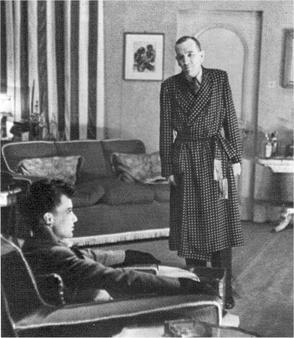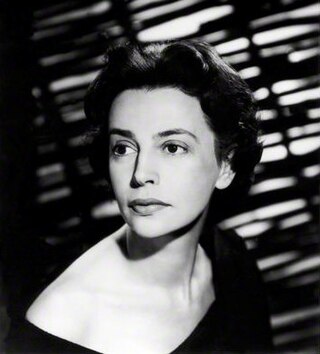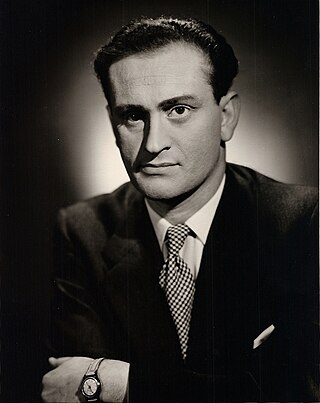
A Day by the Sea is a 1953 play by the British writer N. C. Hunter, first produced in 1953.

A Day by the Sea is a 1953 play by the British writer N. C. Hunter, first produced in 1953.
After premiering at the Royal Court Theatre, Liverpool on 26 October 1953 the play toured to Manchester, Glasgow and Edinburgh before opening at the Haymarket Theatre in the West End of London, where it ran for 386 performances from 26 November 1953 to 30 October 1954. [1] John Gielgud directed the production. [2]
The play had its American premiere in Los Angeles on 17 August 1955, before the production was taken to San Francisco and then to Broadway. [3] On 26 September 1955 it opened in New York at the ANTA Theatre, running for 24 performances. [4] The director was Cedric Hardwicke. [5]
| Original cast, Liverpool and London | Replacements during London run | Broadway cast | |
|---|---|---|---|
| David Anson | Lewis Casson | Harcourt Williams | Halliwell Hobbes |
| Toby Eddison | Peter Murphy | Colin Gibson | Barclay Hodges |
| Dr Farley | Ralph Richardson | Brewster Mason | Dennis King |
| Julian Anson | John Gielgud | Hume Cronyn | |
| William Gregson | Frederick Piper | John W. Austin | |
| Humphrey Caldwell | Lockwood West | Leo Britt | |
| Elinor Eddison | Patricia Laurence | Margaret McCourt | Veronica Cole |
| Miss Mathieson | Megs Jenkins | Megs Jenkins | |
| Laura Anson | Sybil Thorndike | Mary Jerrold | Aline MacMahon |
| Frances Falter | Irene Worth | Jessica Tandy |
There is little incident in the play, which is a study of the various characters rather than a narrative. [2] It is set in and near the Dorset country house of Laura Anson, a brisk and sensible elderly woman, determined to keep the family home going, though worried that once she is dead nobody will succeed her in this. Her son, Julian, is a workaholic diplomat who abruptly realises that his obsession with his work has left him without a personal life. He attempts to interest the widowed, emotionally damaged Frances, but after two disastrous marriages she cannot face another deep personal relationship. David Anson, Julian's uncle, is an octogenarian who muses on the transitory nature of life. The governess, Miss Mathieson, despairs of finding a husband and makes an unsuccessful attempt to engage the affections of the bibulous but shrewd Dr Farley. While the characters are having a picnic on the beach a Foreign Office official comes to tell Julian he is no longer required in the embassy in Paris and must return to London. [2]
The play divided the critics. There was general agreement that the piece was reminiscent of the plays of Chekhov, but some found it static and lacking Chekhovian depth. [5] [6] Ivor Brown in The Observer called it "second rate … a competent pastiche of Russian fin de siècle theatre", albeit "very handsomely" done. [6] Others found it thoughtful and touching. The Times called it "essentially a poetic theme – treated gently, stylishly, prosaically". [2] The Spectator said, "Frustration and nostalgia are the predominant themes of the play, given fine acting, direction, and production". [7] The critic J. C. Trewin called it "a curiously undramatic, derivative piece … but its lingering tenderness can find the heart." [8] The reviewer in The Sphere said, "Mr Hunter skilfully depicts a household more than usually stocked with unfulfilled lives". [9]
The play was revived in London at the Finborough Theatre in 2008, directed by Tom Cooper, with a cast including Juliet Ackroyd, Lucy Russell, Romy Tennant and Stephen Omer. It was revived again at the Southwark Playhouse in 2017, with John Sackville in the leading role of Julian. [10]
A Day by the Sea has twice been adapted for British television. In 1959 Associated Television broadcast a production with Gielgud (in his first television role) and Megs Jenkins reprising their stage parts, and Gladys Cooper (Laura), Nicholas Hannen (David), Roger Livesey (Dr Farley) and Margaret Leighton (Frances) as co-stars. [11] The second adaptation, by the BBC (1964) starred Gwen Ffrangcon-Davies (Laura), Robert Flemyng (Julian), Rachel Gurney (Frances), Felix Aylmer (David), and Gene Anderson (Miss Mathieson). [12] [13]
The BBC broadcast radio adaptations of the play in 1955 and 1991. The first, produced by Val Gielgud, featured Robert Eddison (Julian), Gladys Young (Laura), Gwen Cherrell (Frances), John Turnbull (David), Belle Chrystall (Miss Mathieson) and Brewster Mason (Dr Farley). [14] The second starred Wendy Hiller (Laura), Richard Pasco (Julian), Alan Wheatley (David), Michael Hordern (Dr Farley) and Barbara Leigh Hunt (Frances). [15]
Sir Ralph David Richardson was an English actor who, with John Gielgud and Laurence Olivier, was one of the trinity of male actors who dominated the British stage for much of the 20th century. He worked in films throughout most of his career, and played more than sixty cinema roles. From an artistic but not theatrical background, Richardson had no thought of a stage career until a production of Hamlet in Brighton inspired him to become an actor. He learned his craft in the 1920s with a touring company and later the Birmingham Repertory Theatre. In 1931 he joined the Old Vic, playing mostly Shakespearean roles. He led the company the following season, succeeding Gielgud, who had taught him much about stage technique. After he left the company, a series of leading roles took him to stardom in the West End and on Broadway.

Sir Arthur John Gielgud, was an English actor and theatre director whose career spanned eight decades. With Ralph Richardson and Laurence Olivier, he was one of the trinity of actors who dominated the British stage for much of the 20th century. A member of the Terry family theatrical dynasty, he gained his first paid acting work as a junior member of his cousin Phyllis Neilson-Terry's company in 1922. After studying at the Royal Academy of Dramatic Art (RADA), he worked in repertory theatre and in the West End before establishing himself at the Old Vic as an exponent of Shakespeare in 1929–31.

The Browning Version is a play by Terence Rattigan, seen by many as his best work, and first performed on 8 September 1948 at the Phoenix Theatre, London. It was originally one of two short plays, jointly titled "Playbill"; the companion piece being Harlequinade, which forms the second half of the evening. The Browning Version is set in a boys' public school and the Classics teacher in the play, Crocker-Harris, is believed to have been based on Rattigan's Classics tutor at Harrow School, J. W. Coke Norris (1874–1961).

The Theatre Royal Haymarket is a West End theatre on Haymarket in the City of Westminster which dates back to 1720, making it the third-oldest London playhouse still in use. Samuel Foote acquired the lease in 1747, and in 1766 he gained a royal patent to play legitimate drama in the summer months. The original building was a little further north in the same street. It has been at its current location since 1821, when it was redesigned by John Nash. It is a Grade I listed building, with a seating capacity of 888. The freehold of the theatre is owned by the Crown Estate.

Present Laughter is a comic play written by Noël Coward in 1939 but not produced until 1942 because the Second World War began while it was in rehearsal, and the British theatres closed. The title is drawn from a song in Shakespeare's Twelfth Night that urges carpe diem. The play has been frequently revived in Britain, the US and beyond.

An Ideal Husband is a four-act play by Oscar Wilde that revolves around blackmail and political corruption, and touches on the themes of public and private honour. It was first produced at the Haymarket Theatre, London in 1895 and ran for 124 performances. It has been revived in many theatre productions and adapted for the cinema, radio and television.

A Woman of No Importance by Oscar Wilde is "a new and original play of modern life", in four acts, first given on 19 April 1893 at the Haymarket Theatre, London. Like Wilde's other society plays, it satirises English upper-class society. It has been revived from time to time since his death in 1900, but has been widely regarded as the least successful of his four drawing room plays.

Dame Agnes Sybil Thorndike, Lady Casson, was an English actress whose stage career lasted from 1904 to 1969.
David Haig Collum Ward is an English actor and playwright. He has appeared in West End productions and numerous television and film roles over a career spanning four decades.

Marius Re Goring was an English stage and screen actor. He is best remembered for the four films he made with Powell & Pressburger, particularly as Conductor 71 in A Matter of Life and Death and as Julian Craster in The Red Shoes. He is also known for playing the titular role in the long-running TV drama series, The Expert. He regularly performed French and German roles, and was frequently cast in the latter because of his name, coupled with his red-gold hair and blue eyes. However, in a 1965 interview, he explained that he was not of German descent, stating that "Goring is a completely English name."

Stephen Umfreville Hay Murray was an English cinema, radio, theatre and television actor.
Alan Wheatley was an English actor. He was a well known stage actor in the 1930s, 1940s and 1950s, appeared in forty films between 1931 and 1965 and was a frequent broadcaster on radio from the 1930s to the 1990s, and on television from 1938 to 1964. His most prominent television role was the Sheriff of Nottingham in the 1950s TV series The Adventures of Robin Hood, with Richard Greene as Robin Hood; Wheatley played the sheriff in 54 episodes between 1955 and 1959. Earlier, he had played Sherlock Holmes in the first television series featuring the great detective.

Dulcie Winifred Catherine Savage Denison,, known professionally as Dulcie Gray, was a British actress, mystery writer and lepidopterist.

John Michael Terence Wellesley Denison was an English actor. He often appeared with his wife, Dulcie Gray, with whom he featured in several films and more than 100 West End theatre productions.

Benjamin Arthur Flemyng, known professionally as Robert Flemyng, was a British actor. The son of a doctor, and originally intended for a medical career, Flemyng learned his stagecraft in provincial repertory theatre. In 1935 he appeared in a leading role in the West End, and the following year had his first major success, in Terence Rattigan's comedy French Without Tears. Between then and the Second World War he appeared in London and New York in a succession of comedies.

Gwendoline Watford, professionally known after the mid-1950s as Gwen Watford, was an English actress.
Peter Bayliss was an English actor. Bayliss was born in Kingston upon Thames and trained at the Italia Conti Academy and the John Gielgud Company. More than six feet tall, with a voice to match, he supplemented it with a barrage of wheezings, croakings, mutterings and, as the opera singer in Frontiers of Farce, garglings. In 1956 he appeared on stage in "The Matchmaker" at the Royale Theatre in New York and in 1960 he appeared in "Ross" at the Royal Haymarket Theatre in London. His 20 films ranged from The Red Shoes (1948) to Darling (1965). He acted in more than 40 television productions including Please Sir!, The Sweeney, Coronation Street, Lovejoy and The Bill, plus dramas like Bye, Bye Columbus (1990), Merlin (1998) and The Arabian Nights (1999). On radio he was particularly good in Jacobean adaptations, playing characters with names such as Sir Moth-Interest and Walter Whorehound. He appeared in more than 100 theatre productions. He made several films for the Children's Film Unit in his later years. He died in 2002 at the age of 80

Robert Marsden was an English actor, director, dramatic recitalist and teacher of drama at the Royal Academy of Dramatic Art, and elsewhere. He was also one of the earliest wartime members of the BBC Radio Drama Repertory Company, formed to meet the circumstances of World War II.

Simon and Laura is a 1955 British comedy film directed by Muriel Box and starring Peter Finch and Kay Kendall.
Waters of the Moon is a 1951 stage play by N. C. Hunter which originally ran for two years at the Theatre Royal Haymarket from 1951 to 1953. It was adapted into a 1961 TV play broadcast by the Australian Broadcasting Corporation. This version was directed by Christopher Muir. In 1977 it was revived at the Theatre Royal Haymarket with Ingrid Bergman as Helen Lancaster and Wendy Hiller, who had appeared in the original 1951 production, now playing the role of Mrs. Whyte.